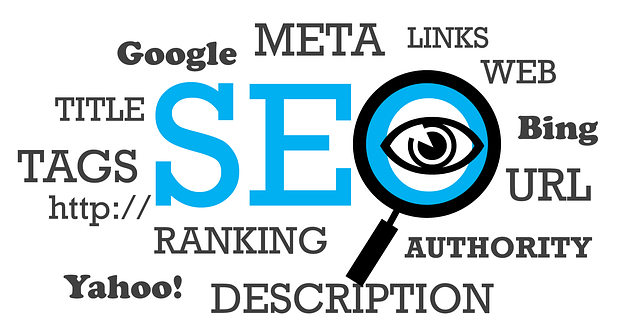In today's digital era, Search Engine Optimization (SEO) is crucial for businesses aiming to boost online presence and attract organic traffic. Essential tips include:
1. Keyword Research: Use tools like Google Keyword Planner, SEMrush, or Ahrefs to identify relevant search terms and long-tail keywords, focusing on natural content creation.
2. On-Page Optimization: Create high-quality, engaging content with relevant keywords; optimize for speed, mobile, and schema markup to enhance user experience and signal search engines of your authority.
3. Backlink Building: Earn high-quality backlinks from reputable sources through guest blogging, shareable content, and industry influencer relationships, avoiding spammy practices.
4. Technical SEO: Implement structured data markup, optimize site speed, ensure clear navigation, and maintain consistent NAP citations for better search engine understanding and placement.
5. Content Creation: Diversify content formats, update regularly, and optimize meta elements to provide engaging content that aligns with user interests and algorithms.
6. Local SEO: Optimize Google My Business, use location-specific keywords, and foster community connections for higher local rankings and increased foot traffic.
7. Analytics: Track key metrics using tools like Google Search Console to refine strategies, optimize aspects, and improve overall performance.
Boosting your website’s rankings with effective SEO strategies is essential for online visibility and driving targeted traffic. This comprehensive guide offers valuable insights into various aspects of search engine optimization (SEO) tips for ranking higher. From understanding the fundamentals of SEO to mastering content creation, each section provides actionable steps to enhance your digital presence. By exploring keyword research, on-page optimization, backlinks, technical SEO, local targeting, and measurement techniques, you’ll equip yourself with the tools needed to elevate your online performance.
Understanding SEO: The Foundation of Online Visibility

In today’s digital era, understanding Search Engine Optimization (SEO) is paramount for any business aiming to boost its online visibility and attract organic traffic. SEO tips for ranking higher involve a strategic approach to optimizing your website and content so that search engines like Google can easily discover and index your pages. This process begins with keyword research, where you identify the terms potential customers use when searching for products or services similar to yours. Incorporating these keywords naturally into your website’s content—including titles, headings, meta descriptions, and body text—is a crucial SEO tip for improving search rankings.
Beyond keyword optimization, other essential SEO tips include enhancing site speed by compressing images and minimizing code, ensuring mobile responsiveness to cater to the majority of users accessing websites via smartphones, and building quality backlinks from reputable sources. A solid foundation in SEO allows your website to navigate the complex algorithms of search engines, making it more likely to appear higher in search results and attract a steady stream of targeted visitors.
Keyword Research: Unlocking the Secrets to Targeted Traffic

Keyword research is a vital component of any successful SEO strategy, and it’s a process that should never be overlooked if you want to boost your rankings and attract targeted traffic. By taking the time to understand what keywords potential customers are using to search for products or services like yours, you can ensure that your content resonates with your audience and ranks higher in search engine results. This involves using tools like Google Keyword Planner, SEMrush, or Ahrefs to uncover relevant keywords, analyze their search volumes, and identify long-tail keywords that may be easier to rank for.
When conducting keyword research, it’s essential to focus on terms that align with your brand and business objectives. Avoid stuffing keywords into your content; instead, create valuable, informative pieces around the topics that naturally include your target keywords. Remember, SEO tips for ranking higher go beyond just selecting the right keywords—it’s about understanding user intent, crafting compelling content, and continuously monitoring and adjusting your strategy based on performance data.
Optimizing On-Page Elements for Maximum Impact

When it comes to SEO tips for ranking higher, optimizing on-page elements is a crucial step that often gets overlooked. Start by ensuring your website’s content is both relevant and engaging. Use keywords strategically within your headings, meta descriptions, and throughout your text, but always maintain a natural flow. The goal is to provide value to your audience while also signaling to search engines that you’re an authoritative source.
Additionally, pay attention to technical aspects like page load speed, mobile-friendliness, and schema markup. A fast-loading website not only improves user experience but also boosts your search engine rankings. Make sure your site is optimized for mobile devices as more users access the internet via their smartphones. Schema markup helps search engines understand your content better, which can lead to rich snippets and increased click-through rates.
Building High-Quality Backlinks: Earning Trust and Authority

Building high-quality backlinks is a crucial SEO tip for ranking higher. These links act as votes of confidence from other websites, signaling to search engines that your content is valuable and trustworthy. When earning backlinks, focus on quality over quantity. Seek out reputable and relevant websites in your niche that have established authority. Guest blogging, creating insightful and shareable content, and building relationships with industry influencers are effective strategies for acquiring these valuable links.
By consistently earning high-quality backlinks, you can boost your website’s authority and trustworthiness in the eyes of search engines. This, in turn, improves your rankings on search result pages, driving more organic traffic to your site. Remember, each backlink should be a natural and relevant addition to your online presence, enhancing your site’s reputation without appearing spammy or manipulative.
Technical SEO Considerations: Ensuring Your Site is Search Engine Friendly

When it comes to boosting rankings with SEO, Technical SEO Considerations are often overlooked but play a crucial role in ensuring your site is search engine friendly. Start by making sure your website has a clear and hierarchical structure with proper navigation. This helps search engines understand your content’s context and relevance, leading to better indexing and higher rankings. Implement structured data markup, too. It provides search engines with additional information about your pages, enabling them to display rich snippets in results—a visual boost that can increase click-through rates.
Other essential SEO tips for ranking higher include optimizing your site speed. Even a slight delay can deter users and negatively impact rankings. Compressing images, leveraging browser caching, and using content delivery networks (CDNs) are effective strategies to enhance loading times. Additionally, ensure mobile responsiveness as search engines prioritize mobile-friendly sites. Make it easy for users to navigate and interact with your website on various devices, demonstrating to search engines that your site is designed with user experience in mind.
Content Creation Strategies for Engaging and Ranking Well

Creating high-quality, engaging content is a cornerstone of effective SEO tips for ranking higher. To capture your target audience and search engine algorithms alike, focus on producing unique, informative, and valuable content that addresses user queries and intents. Incorporate relevant keywords naturally throughout your text, but remember, keyword stuffing can be detrimental. Instead, strive for a harmonious blend where keywords enhance readability without dominating the narrative.
Diversify your content formats—mix it up with blogs, videos, infographics, or podcasts—to cater to diverse user preferences and search behaviors. Regularly update your content to keep it fresh and relevant, as search engines favor dynamic, current information. Additionally, optimizing meta titles, descriptions, and headings ensures that each piece of content is not only engaging but also optimized for maximum SEO impact.
Utilizing Local SEO for Geographic Targeting

In today’s digital era, local businesses cannot afford to overlook the power of SEO Tips for Ranking Higher, especially when it comes to geographic targeting. By implementing Local SEO strategies, companies can boost their online visibility and attract a more relevant audience. This involves optimizing Google My Business listings, ensuring consistent NAP (Name, Address, Phone number) citations across various directories, and creating location-specific content that resonates with nearby customers.
For instance, a bakery in Downtown Los Angeles should incorporate keywords like “best bakeries in LA” or “fresh pastries near me” in their website copy and blog posts to capture the attention of nearby residents and tourists looking for delicious treats. This targeted approach not only improves search engine rankings but also fosters a stronger connection with the local community, driving more foot traffic and increasing sales.
Measuring and Analyzing Results: Refining Your SEO Strategy

Measuring and analyzing results is a crucial step in refining your SEO strategy. After implementing various SEO tips for ranking higher, it’s essential to track performance using analytics tools provided by search engines like Google Search Console or third-party software. By monitoring key metrics such as organic traffic, keyword rankings, bounce rates, and conversion rates, you gain valuable insights into what’s working and what needs improvement.
This data allows you to make informed decisions about adjusting your content strategy, optimizing on-page elements, building high-quality backlinks, and refining technical SEO aspects like site speed and mobile usability. Regularly reviewing and analyzing these results helps ensure that your efforts align with the latest search engine algorithms, ultimately leading to better rankings and increased visibility for your website.
